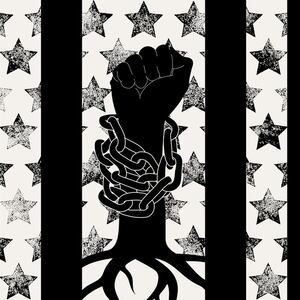On the heels of the assassination of President Jovenel Moïse, Haiti’s interim government has pleaded for international help—and while it has not included reparations in those appeals, they are long overdue. In fact, the issue of reparations can’t be extracted from Haiti’s condition today.
Britain, the United States, France—nations that were once key players in the transatlantic slave trade and have now firmly declared a refusal to even seriously consider reparations—not only once advocated for cash restitution, but actually made compensatory payments.
But those reparations weren’t paid to the Black people who’d been forced to endure the brutality of slavery or their descendants. Instead, that money was paid to the white folks who did the enslaving.
France led the way. In the late 1700s, France’s cruel colonial exploits in Saint Domingue—today known as Haiti—were making the European country more money than any of its other Caribbean occupations. The tiny island nation “exported 60 percent of all the coffee and 40 percent of all the sugar consumed in Europe,” a level of profiteering achieved by quite literally working enslaved Black people to death. Most of those stolen from Africa and transported to Haiti would die before their 22nd birthdays because of the inhumane horrors to which they were subjected. The human lives taken by these massacres of forced labor were replenished by the French with roughly 40,000 new people taken from Africa each year.
When the French Revolution kicked off in 1787, its purported ideals of liberté, égalité, fraternité were embraced by enslaved Black folks in Haiti, who in 1791 organized to secure their freedom and overthrow France’s slaveocracy. Just over 12 years later, the Haitian Revolution succeeded in establishing the nation as the first Black-led republic in the world. But any opportunity for the newly independent country to truly prosper and thrive was squashed by France. In 1825, surrounded by French war boats threatening invasion and the reimposition of slavery, Haiti was forced into an agreement to pay some 150 million francs—with interest, no less—in reparations to French enslavers angry over the loss of their human and terrestrial “properties.” The debt was reduced to 90 million francs a few years later, but the demand was far too much for a new country just finding its footing. At the turn of the century, Haiti was giving France a staggering “80 percent of its national budget” to settle a debt pocketed by “more than 7,900 former slave owners and their descendants” that would only be settled in 1947. The payments left Haiti in financial ruin, setting it up for the cycle of instability, corruption, exploitation and intervention that has troubled its existence.
The United States under President Thomas Jefferson aided France in its nefarious effort by cutting off funds to Haiti, a strategy pursued to ensure that its own system of Black chattel slavery wouldn’t come under threat. Haiti wouldn’t be recognized as an independent nation by the U.S. government for six decades, until the presidency of Abraham Lincoln, who also instituted a program of reparations that served to enrich white enslavers at home.
In 1862, Lincoln signed the Compensated Emancipation Act, a bill which abolished slavery in Washington, D.C., and gave enslavers $300 (or more than $8,000 in 2021 dollars) for the inconvenience of having the people they kept in bondage taken away. The Black people who had been enslaved were offered no recompense for the years they spent laboring for free—though the legislation did offer them a bribe of just $100 to leave the country they had built on their backs for “the republics of Hayti or Liberia, or such other country beyond the limits of the United States as the President may determine.” There were few takers, but most of the 960 enslavers who applied for the reparations program got paid.
“Let’s look at the fortunes of the larger holders of enslaved people—for example, George Washington Young, the largest slaveholder in the district, or Margaret Barber, the second largest,” historian and author Carroll Gibbs told me last year when we spoke about the U.S. reparations policy. “Barber’s farm, North View, is now the site of the US vice president’s house and the Naval Observatory. She was able to use the money [from the act] and parlay it and invest it.” Another, Ann Biscoe, “had an employment bureau, essentially. She made good money leasing out the enslaved people who were under her control. When compensated emancipation came, she still made out fairly well.” All told, the U.S. Department of Treasury paid out the equivalent of $23 million in 2020 dollars to white enslavers in D.C.
In 1833, when Britain passed the Slavery Abolition Act across most of its colonies, it passed along handouts of 20 million pounds—that’s 2.4 billion pounds in today’s money—or roughly 40 percent of its national budget at the time to white enslavers. (Or, to quote the law, “Persons at present entitled to the Services of the Slaves to be manumitted and set free by virtue of this Act for the Loss of such Services.”) Much of that money was borrowed, and not paid back until 2015, incredibly. The Legacies of British Slave-ownership Project undertaken by University College London has been able to connect payments to more than 46,000 enslavers across the British Empire—and to note their descendants, including former Prime Minister David Cameron.
Senate Minority Leader Mitch McConnell—whose family enslaved at least 14 Black folks before the Civil War—two years ago dismissed reparations by stating that American slavery was “something that happened” long ago, as if two-and-a-half centuries of Black enslavement and lasting anti-Blackness have had no impact on America’s economic, social, and political policy. David Brooks once wrote that the problems Haiti faces are attributable to everything from its “voodoo religion” to Haitians’ “progress-resistant” culture, and Bloomberg recently suggested Haiti is “ungovernable,” without once mentioning the outsized debt that bankrupted the country in its early days and left it vulnerable and boneless in the world. Britain’s Foreign and Commonwealth Office in 2014 brushed off Caribbean demands for reparations as "not the answer,” claiming those nations and the U.K. should instead “focus on the shared global challenges that face our countries in the twenty-first century”—which read a lot like an effort to untether the future from a past in which the colonizers profited steeply off the colonized.
Reparations for Black slavery were paid and popular when they gave yet more currency to white global supremacy and power. The idea of slavery reparations only become controversial when the proposed recipients were the actual Black folks who were enslaved and their descendants.



